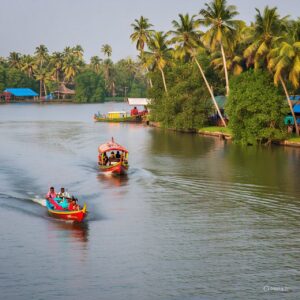
Kerala’s backwaters are a breathtaking natural wonder and a symbol of the state’s unique ecological and cultural heritage. This vast network of serene lakes, winding canals, and lush green lagoons offers an unforgettable experience of Kerala’s rural charm, biodiversity, and houseboat tourism. As tourist interest grows, sustainable practices are being adopted to protect the delicate ecosystem while promoting responsible travel.
What Makes Kerala’s Backwaters Unique?
Kerala’s backwaters are among India’s most captivating natural treasures. Spanning over 900 km along the Malabar Coast, they are formed by the merging of rivers like the Periyar, Pamba, and Karamana with the Arabian Sea. These waterways are home to thriving biodiversity, including mangroves, aquatic life, and migratory birds, and support village communities that depend on them for their livelihood.
Backwater Highlights
-
Calm, scenic waters are ideal for houseboat tourism
-
Traditional livelihoods like coir making and fishing
-
Ayurvedic wellness centers and eco-friendly resorts
-
Lush paddy fields and swaying coconut groves
Popular Backwaters in Kerala
1. Alappuzha (Alleppey)
Often called the “Venice of the East,” Alappuzha is Kerala’s most iconic backwater destination. Visitors enjoy luxury houseboat stays, serene canal views, and events like the Nehru Trophy Boat Race.
2. Kumarakom
Located along Vembanad Lake, Kumarakom is a paradise for bird watchers. Explore quiet resorts, visit the bird sanctuary, and enjoy canoeing through peaceful waters.
3. Kollam
Explore the tranquil Ashtamudi Lake and enjoy long backwater cruises from Kollam to Alappuzha. It’s less commercialized, offering a more serene experience.
4. Kuttanad
Known as Kerala’s “Rice Bowl,” Kuttanad is famous for its unique farming practices below sea level. Boat rides through this scenic region are a must.
5. Kasaragod
Located in North Kerala, this lesser-known destination offers unspoiled backwaters, cultural richness, and Theyyam performances.
6. Kochi Backwaters
A blend of heritage and nature. Enjoy backwater rides around Fort Kochi, Willingdon Island, and Kadamakkudy Islands.
7. Thiruvallam
A peaceful and culturally rich backwater location near Thiruvananthapuram. It’s ideal for those seeking less-crowded, nature-filled experiences.
Top Activities in Kerala’s Backwaters
1. Houseboat Cruises
Experience a stay on a traditional kettuvallam, now fitted with modern amenities. Drift past paddy fields, palm trees, and quaint village scenes.
2. Village Tours
Explore local villages on foot or by cycle. Learn about fishing, coir weaving, and Kerala’s rural traditions.
3. Bird Watching
Visit the Kumarakom Bird Sanctuary or Pathiramanal Island to spot exotic and migratory birds.
4. Canoeing & Kayaking
Eco-friendly and intimate ways to explore the narrow canals and enjoy Kerala’s natural beauty up close.
5. Ayurveda & Yoga
Many eco-resorts offer Ayurvedic treatments, yoga retreats, and holistic wellness programs in tranquil settings.
Where to Stay
You’ll find accommodations for every budget across the backwater regions:
-
Luxury Houseboats: Fully equipped with AC, personal chefs, and scenic decks
-
Eco-Resorts: Built with sustainable materials; promote green living
-
Homestays: Hosted by local families, offering authentic Kerala hospitality
-
Budget Stays: Affordable lodges and guesthouses near the canals
Taste the Local Flavors
Food is an essential part of the backwater experience. Locally grown, chemical-free ingredients form the base of many dishes, with influences from Kerala’s coastal and agrarian culture.
Must-Try Dishes
-
Karimeen Pollichathu: Pearl spot fish grilled in banana leaf
-
Appam & Stew: Rice pancakes with coconut-rich meat or veg stew
-
Toddy (Kallu): A mildly alcoholic drink made from coconut sap
-
Sadya: A traditional vegetarian feast served on banana leaves
The Challenge: Tourism vs Ecosystem
While tourism boosts local economies, it also presents threats to Kerala’s biodiverse backwater ecosystem:
-
Water pollution from diesel-powered houseboats
-
Plastic waste left by careless visitors
-
Mangrove loss due to unregulated construction
-
Disturbance to wildlife from noise and overactivity
Sustainable Tourism: Kerala’s Green Approach
Kerala is now leading efforts to balance tourism with eco-preservation. Here’s how:
1. Green-Certified Houseboats
Eco-friendly boats use solar energy, bio-toilets, and non-toxic materials, helping reduce pollution.
2. Plastic-Free Campaigns
Local governments have declared many zones plastic-free, encouraging reusable options for tourists.
3. Community-Based Tourism
Villagers are trained to offer homestays, cultural shows, and guided tours. This keeps income local and promotes responsible travel.
4. Improved Waste Management
Municipalities are running awareness drives, promoting composting and waste segregation in tourist areas.
5. Mangrove Restoration Projects
Efforts are underway to replant mangroves, which support soil health, protect fish nurseries, and prevent erosion.
Why Backwater Preservation Matters
Kerala’s backwaters are not just scenic—they are vital to:
-
Fishermen’s and farmers’ livelihoods
-
Biodiversity and habitat preservation
-
Natural flood control and climate resilience
-
Kerala’s cultural identity and traditions
Losing them would harm more than just the tourism industry—it would endanger an entire way of life.
Final Thoughts
Kerala’s backwaters are a rare blend of natural beauty, cultural richness, and ecological significance. From the houseboats of Alappuzha to the peaceful waters of Kasaragod, the region offers unforgettable experiences for every traveler.
But the future of these waters depends on our choices. By supporting eco-friendly tourism, respecting local customs, and minimizing our environmental footprint, we can help preserve this magical landscape for generations to come.

Leave a Reply